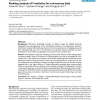Free Online Productivity Tools
i2Speak
i2Symbol
i2OCR
iTex2Img
iWeb2Print
iWeb2Shot
i2Type
iPdf2Split
iPdf2Merge
i2Bopomofo
i2Arabic
i2Style
i2Image
i2PDF
iLatex2Rtf
Sci2ools
122
click to vote
BMCBI
2008
2008
Ranking analysis of F-statistics for microarray data
Background: Microarray technology provides an efficient means for globally exploring physiological processes governed by the coordinated expression of multiple genes. However, identification of genes differentially expressed in microarray experiments is challenging because of their potentially high type I error rate. Methods for large-scale statistical analyses have been developed but most of them are applicable to two-sample or two-condition data. Results: We developed a large-scale multiple-group F-test based method, named ranking analysis of F-statistics (RAF), which is an extension of ranking analysis of microarray data (RAM) for twosample t-test. In this method, we proposed a novel random splitting approach to generate the null distribution instead of using permutation, which may not be appropriate for microarray data. We also implemented a two-simulation strategy to estimate the false discovery rate. Simulation results suggested that it has higher efficiency in finding different...
Related Content
| Added | 09 Dec 2010 |
| Updated | 09 Dec 2010 |
| Type | Journal |
| Year | 2008 |
| Where | BMCBI |
| Authors | Yuan-De Tan, Myriam Fornage, Hongyan Xu |
Comments (0)

